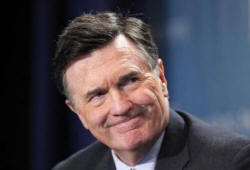|
 Markets
overlook U.S. strength, overreact to China: Fed's
Lockhart Markets
overlook U.S. strength, overreact to China: Fed's
Lockhart
 Send a link to a friend
Send a link to a friend
[September 24, 2015]
By Howard Schneider
COLUMBUS, Ga (Reuters) - Investors that
have roiled global markets and thrown Federal Reserve policy off track
should focus on the strength of the U.S. economy rather than the more
remote risks of a global slowdown, Atlanta Federal Reserve bank
president Dennis Lockhart said on Wednesday.
|
|
 "Markets should first look at our characterization in the (Federal
Open Market Committee) statements and in individual speeches of the
economy really being on solid ground and performing well," said
Lockhart, who supported last week's decision by the Fed to delay an
interest rate hike but still says he expects to vote to raise rates
some time this year. "Markets should first look at our characterization in the (Federal
Open Market Committee) statements and in individual speeches of the
economy really being on solid ground and performing well," said
Lockhart, who supported last week's decision by the Fed to delay an
interest rate hike but still says he expects to vote to raise rates
some time this year.
His comments come a day before Fed Chair Janet Yellen delivers a
high-profile speech on inflation, a topic that has divided
policymakers who worry recent readings show a weakening economy from
those who are confident inflation will rebound as the United States
continues to grow.
The issue is central to the timing of a first rate hike because one
of the Fed's policy targets is a steady inflation rate of 2 percent,
still substantially beyond recent levels. And its policy statement
says explicitly rates should not be raised until there is confidence
inflation will pick up.

Yellen will have to reconcile the Fed's disparate views at a time of
unusual uncertainty in global markets. China, a bedrock of global
growth for much of this century, is in the throes of an unexpected
slowing. Coupled with tepid growth in Europe, Japan and elsewhere,
there is concern the United States could be dragged down as well.
Weak Chinese manufacturing data on Wednesday triggered a drop in
U.S. markets, another example of the volatility that prompted the
Fed last week to delay what had been an expected rate hike -- its
first in nearly a decade.
Lockhart said he thought worries about the state of the global
economy had become exaggerated, and were given too much weight over
continued growth, healthy consumption and other U.S. strengths.
"China is slowing to still a very respectable pace of growth. It is
ratcheting down a little bit, but there is a decent chance that the
world is overreacting," he said.
"Markets should appreciate that the likelihood of substantial
spillover to the U.S. domestic economy from developments abroad...is
likely to be small," he said.
[to top of second column] |

Concern about China, the sharp drop in U.S. equities, and the
possibility that might cause a broader U.S. slowdown led the Fed
last week to hold off on its long-debated rates liftoff.
That decision itself has contributed to uncertainty about the path
of Fed policy, with investors pushing expectations of an initial
rate hike ever-deeper into 2016 even as policymakers say they remain
intent on hiking rates this year.
The situation has led to some of the most pointed criticism yet of
Yellen, who steadily guided a "data dependent" central bank towards
a rate hike as the U.S. economy improved, only to pull back at the
last minute even though nothing fundamental changed in the U.S.
outlook.
Cornerstone Macro analyst Roberto Perli said Yellen's speech on
Thursday in Amherst, Massachusetts, will offer an important
opportunity for her to clarify where the Fed stands.
Yellen has allowed expectations of a rate hike to build, he said,
and now she needs to "either evaluate those expectations or...try to
steer markets in a different direction by providing some rationale
for whatever (she thinks) is the right thing to do at this point."
(Reporting by Howard Schneider; Editing by Andrea Ricci)
[© 2015 Thomson Reuters. All rights
reserved.] Copyright 2015 Reuters. All rights reserved. This material may not be published,
broadcast, rewritten or redistributed.
 |